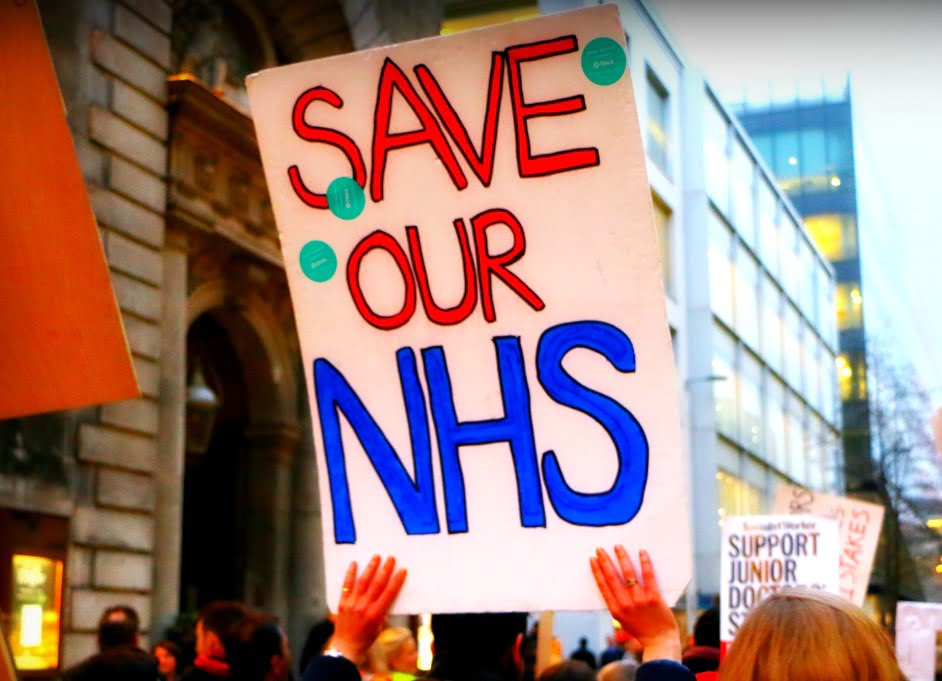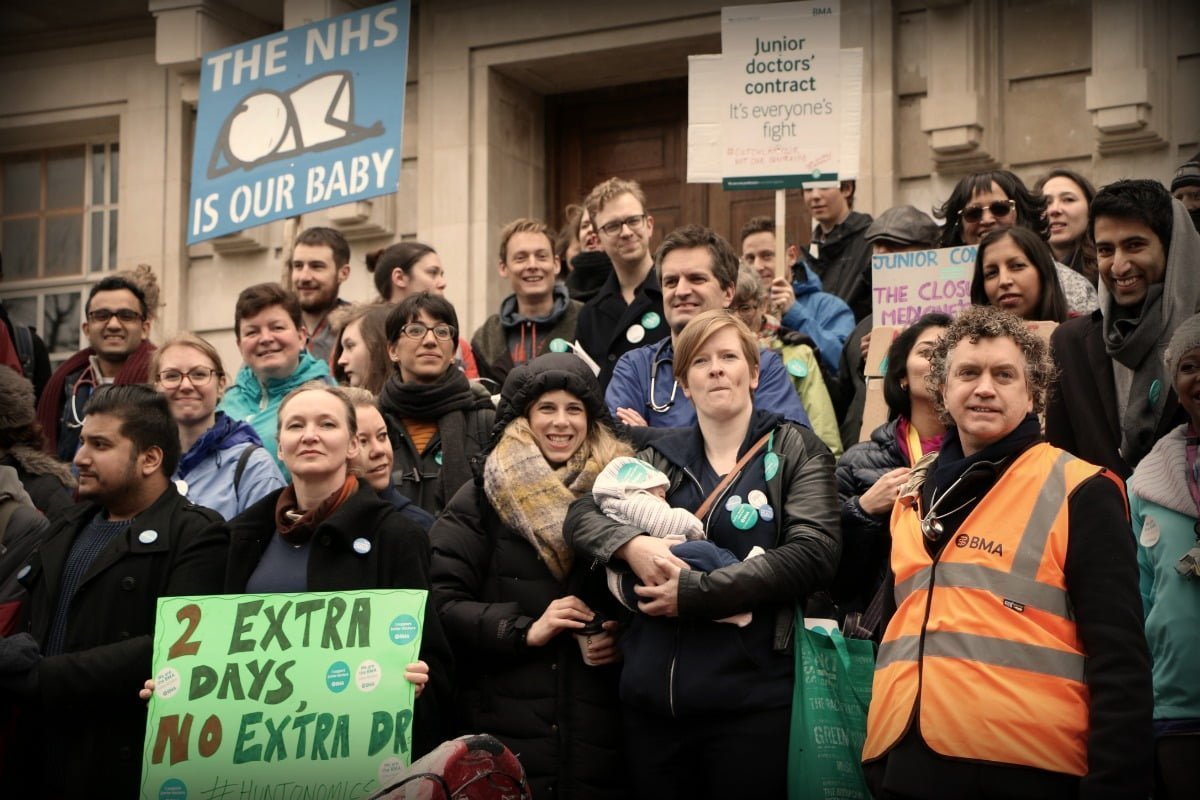The current two-day walkout by junior doctors marks the fourth junior doctors’ strike in England. Later this month, the action will escalate as junior doctors undertake an all-out strike. With Cameron and co. currently weakened by a series of scandals and crises, it is time for the leaders of the labour movement to go on the offensive, call for co-ordinated action, and finish off the Tories.
The current two-day walkout by junior doctors marks the fourth junior doctors’ strike in England. By the end of April, three 48 hour walkouts will have taken place over the course of the last couple of months.
Unlike previous strikes by the junior doctors, which have kept emergency cover in place, the final action – planned to begin on the 26th of April – will be an all-out strike. This step marks an important escalation of the action, demonstrating that junior doctors are willing to fight to the bitter end against this implacable Tory government in defence of their terms and conditions, and the wider NHS.
The mood amongst the doctors has seen a dramatic transformation over the past year, as many of the junior doctors themselves have noted on previous strikes and on the most recent picket lines. Through their struggle, the junior doctors have learnt with first hand experience about the bias in the mainstream media and the ruthlessness of the Tory government. In turn, a mutual feeling of solidarity has developed between NHS staff and workers in other sectors fighting similar battles against austerity.
The task now is for workers in other unions to take up the inspirational lead of the junior doctors and call for co-ordinated action in defence not only of the NHS, but of education, jobs, and public services more generally. The current ballot amongst teachers against the Tory plans for the academisation of schools is the first step towards the wider united struggle that is needed to win.
With Cameron and co. currently weakened by a series of scandals and crises – from the Panama Papers to the splits over the EU referendum – it is time for the leaders of the labour movement to go on the offensive and finish off the Tories. The TUC should be calling for a one-day general strike in defence of the NHS and education, whilst Corbyn and Labour, meanwhile, should be arguing the case for a bold socialist programme as the only alternative to austerity.
With no end in sight to the crisis of capitalism, and with the rottenness of the system increasingly clear to workers and youth, the combustible material of radicalisation is everywhere. With militant leadership and united action, the junior doctors’ struggle could be the spark that ignites the flame.
Junior doctors strike back – round four
The NHS choir and local teachers come out in support of the junior doctors and the fight to defend the NHS.
Posted by Socialist Appeal on Thursday, 7 April 2016
 Support the junior doctors!
Support the junior doctors!
By the Marxist Student Federation
The unprecedented action being taken by junior doctors is a direct result of the attempts by the Conservative government to impose new contracts on the medics that would increase the hours of junior doctors without a proportional increase in wages.
The Tory health secretary, Jeremy Hunt, was left imposing the contract after the BMA (British Medical Association – the doctors’ union) refused to accept the new draconian conditions being asked of the junior doctors, who – under the new contract – would be forced to work at weekends on the same rate as they would work any other day. The BMA rightly contended that the longer and irregular hours that the contract was demanding would lead to poorer outcomes for patients, with quality of care dropping as doctors are overstretched and overworked.
The fact that Hunt went ahead and imposed the contract, despite clear opposition from across the healthcare system, shows that the government are willing to endanger patients and force some of the hardest working members of the NHS to work even longer hours in order to push austerity onto healthcare workers and the wider public.
Since 2010, spending cuts have occurred throughout the public sector, with the NHS in England being (relative to other departments) protected from these cuts. Given the NHS’ hallowed place within British society, this decision made political sense. However, following their achievement of a parliamentary majority at last year’s general election, the Tories felt hubristic and overconfident, and set about taking on the NHS, as part of a wider attack against the welfare state and all the gains of the past, as demanded by the capitalist system in all countries in this epoch of austerity.
The junior doctors were targeted for these attacks because they were seen as an easy target by the Tories. Doctors have not called a strike since the NHS was founded, and junior doctors are on contracts which expire on an annual basis, making it particularly hard for them to organise. However, these strikes show that when workers such as junior doctors are pushed and squeezed, radicalisation and collective action will follow – in this case, a series of 24-hour and 48-hour strikes.
These attacks are part of a creeping privatisation of the NHS that has been being carried out for over a decade. The new contract is an attempt not just to cut government spending at the expense of the working class, but to ensure that the NHS is run into the ground, thus opening the door to privatisation. Meanwhile, if the junior doctors had accepted the new contract, any private firm coming in could run NHS services at a higher profit. This is clearly the government’s plan, as shown by their continued willingness to allow NHS contracts to be given to private care providers.
These strike actions represent the first in many fight-backs by NHS workers against austerity and the Tory government implementing it. The NHS was won by workers, for workers, at a time when capitalism was in an historic upswing. Now that boom has turned into its opposite – permanent stagnation and crisis – and the capitalists and their representatives in Parliament find themselves increasingly unable to afford the basic healthcare needed by so many across Britain.
The facts are clear: capitalism can no longer sustain these hard-fought-for gains of the past. Only through the socialist transformation of society can we protect such gains – including the NHS, pensions, jobs, decent wages, and public services. These strikes are a step forward in the fight to defend these gains, and in turn a step forward in the fight for the socialist alternative that can provide free healthcare for all on a permanent basis.



 Support the junior doctors!
Support the junior doctors!


